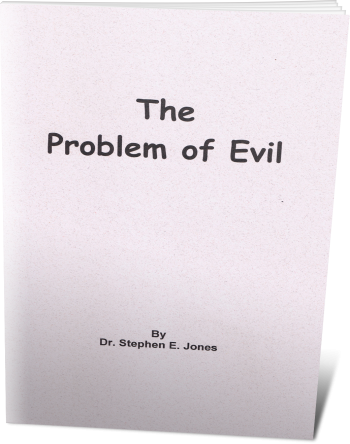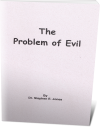Latest Posts
View the latest posts in an easy-to-read list format, with filtering options.

Why does God allow evil to occur on earth? Is God an innocent bystander? This explores the difference between the will and plan of God and between God’s sovereignty and man’s authority.
Category - General

Evil is not an illusion, but it certainly is a matter of perspective. When Stalin starved millions of people during the 1930's, it was “good” from his perspective and “evil” from the perspective of those who were starving. Both good and evil, as viewed by men, are matters of perspective.
I do not mean to say that there is no good or evil. There is. Both are very real, and, yes, there is certainly an absolute difference between right and wrong. I am not attempting to teach moral relativism. What I mean to say is that both good and evil stand positionally below the First Cause, who is God alone. God is good, and God is not evil, but yet God stands above both, using both for His good and perfect purpose.
To express these concepts in human language is not easy, and it is only possible for the human mind to accept and understand insofar as it is revealed by the Holy Spirit. Since I am still in the growth stage, I cannot claim either personal perfection in understanding nor expression, so I ask that you be patient and forgiving with me as I try to discuss these ponderous issues.
In the book of Romans, the apostle Paul makes a distinction between the plan and the will of God. In Romans 2:17, 18 Paul says,
17 But if you bear the name of “Jew” and rely upon the law and boast in God, 18 and know His will [thelema] and approve the things that are essential, being instructed out of the law.
The will of God is expressed here in terms of the law. “Thou shalt not covet” is the will of God. So is “Thou shalt not steal.” The law defines sin, for sin is lawlessness (1 John 3:4), and Paul says “by the law is the knowledge of sin” (Rom. 3:20).
Because of this, some would rather not learn the law, for such knowledge results in a consciousness of sin, which they say is “negative” and must be eradicated from the mind. Those who succeed in their goal are then able to sin without twinge of conscience, and this creates an illusion of righteousness.
Paul uses the term thelema to describe the WILL of God for us. This word is applicable on the human level to govern our dualistic minds. The law defines sin and righteousness for us and allows us to examine and analyze our attitudes, motives, and actions accordingly.
But Paul also uses another Greek word to describe the PLAN of God. We read of this in Paul's discussion of the sovereignty of God in Romans 9. In verses 9-13 Paul sets forth the story of Jacob and Esau as an example of His sovereignty, saying that God chose Jacob and rejected Esau before they were even born, “in order that God’s purpose according to His choice might stand, not because of works but because of Him who calls.”
Those who do not understand the mind of God or His sovereignty attempt to water this down, saying that God knew ahead of time what Esau would be like, and that is why God rejected him. But Paul says no such thing. He says that God chose them before they had done either good or evil in order to show us that it was not by works, but purely by the sovereignty of God.
Of course, this sounds terribly unfair and “evil” to the carnal mind, but this is only unfair to those who do not understand Romans 5. One cannot properly understand the “unfairness” of God's plan if one has not understood the end of the story set forth in the fifth chapter. There, Paul makes it clear that the first Adam brought death upon all men (Rom. 5:12); even so the Last Adam (Jesus Christ) brought life to all men (Rom. 5:18).
Both scenarios came upon all men without their consent and apart from their own will. These decisions were made by God alone. In Adam, He imposed the death penalty, not only upon Adam, but upon all of His descendants—and, indeed, upon all of creation (Rom. 8:22). This would be terribly unfair and unjust, according to the law of God, which says through Ezekiel that the children shall not die for the sins of their father (Ez. 18:20).
Whenever we see God doing something that seems unjust or unfair, we can be sure that it is only because we are not seeing the whole picture. If we could see the end from the beginning, we would know that God is both just and good. The problem is not with God Himself, but with our finite perception and limited perspective.
Only when we combine Romans 5 with Romans 9 can we see the true justice and wisdom of God. God has imposed a temporary injustice upon all men, making all men pay for the sin of their father, Adam. This was done by the law of authority and headship, by which those under authority are adversely affected by the sin of their head.
In the same manner, however, the injustice is fully overthrown and rectified by the same law of headship in that Jesus, the Last Adam, has brought justification to all men (Rom. 5:18). Both acts and both results were done outside the will of man. Hence, Paul says in 1 Cor. 15:22, 23, “for as in Adam all die, so also in Christ all shall be made alive, but each in his own order.”
The only qualification to the overall principle is the fact that not all will be made alive at the same time. Each in his own order [tagma, “squadron”] indicates that there is a certain procedure that must be fulfilled before they enter into immortality. Not all are saved at the same time, nor, indeed, will all be saved in this life time. Most will be saved in the “lake of fire,” as the early Church clearly taught. (See my booklet, A Short History of Universal Reconciliation.)
Yes, there is a second opportunity for salvation. There is no Scripture saying otherwise. In fact, the law itself provides for a second Passover (“justification by faith”) for those who do not keep the first Passover. See Numbers 9. This is prophetic of things to come.
But getting back to our point of departure, Romans 9 gives us a second example of God's sovereign will over man's limited will. In Rom. 9:17 Pharaoh was divinely raised up to oppose the will of God for a season in order to declare God's name throughout all the earth. Verse 19 concludes,
19 You will say to me then, Why does He yet find fault [with Pharaoh]? For who resists His WILL [boulema, “plan”]?
The law defines the will of God, but the plan tells us His sovereign will, the heavenly perspective, the bigger picture. The will of God to Pharaoh was to “let My people go.” The plan of God was to harden Pharaoh's heart (Ex. 7:3; 10:1) in order to DELAY the fulfillment of His will until ten plagues had judged Egypt. Yes, God always took credit for this. We can disagree with Scripture to our own detriment, but we will not change the facts as they are written.
Viewed from the perspective of the finite mind, God was unjust in His dealings with Pharaoh. But when we understand that God's plan includes the salvation of all men, including Pharaoh, we begin to comprehend the mind of the spirit and see the end of the story.
In fact, God freely and unabashedly takes credit for doing what is seemingly unjust, because He is fully confident that in the end all creation will be reconciled in Christ. Col. 1:16-20 says,
16 For by Him all things [ta panta, “the all”] were created, both in the heavens and on earth, visible and invisible, whether thrones or dominions or rulers or authorities—all things have been created by Him and for Him. . . 20 and through Him to reconcile all things [ta panta, “the all”] to Himself, having made peace through the blood of His cross; through Him, I say, whether things on earth or things in heaven.
“The all” of creation in verse 16 is “the all” that Christ reconciled at the cross in verse 20. Not just Adam and His descendants, but all of creation will be set free in the glorious liberty of the sons of God (Rom. 8:22). In fact, the manifestation of the sons of God is good news for the rest of creation, for they are the first-fruits of creation (James 1:18). See my book, Creation’s Jubilee.
Our perspective is the thelema (will) of God, but as we submit to the mind of Christ and His boulema (plan), we are able to understand the purposes of God and see creation from His perspective. We are then left as awestruck as Paul when he says in Rom. 11:33,
33 Oh, the depth of the riches both of the wisdom and knowledge of God! How unsearchable are His judgments and unfathomable His ways! . . . 36 For from Him and through Him and to Him are all things. To Him be the glory forever. Amen.
Our limited perspective gives us an illusion of injustice, when in fact God is discovered to be totally sovereign and totally just. He will maintain His justice by holding all men accountable for the sins done in their life times; but He will teach them righteousness by means of His righteous judgments, “for when the earth experiences Thy judgments, the inhabitants of the world learn righteousness” (Isaiah 26:9).